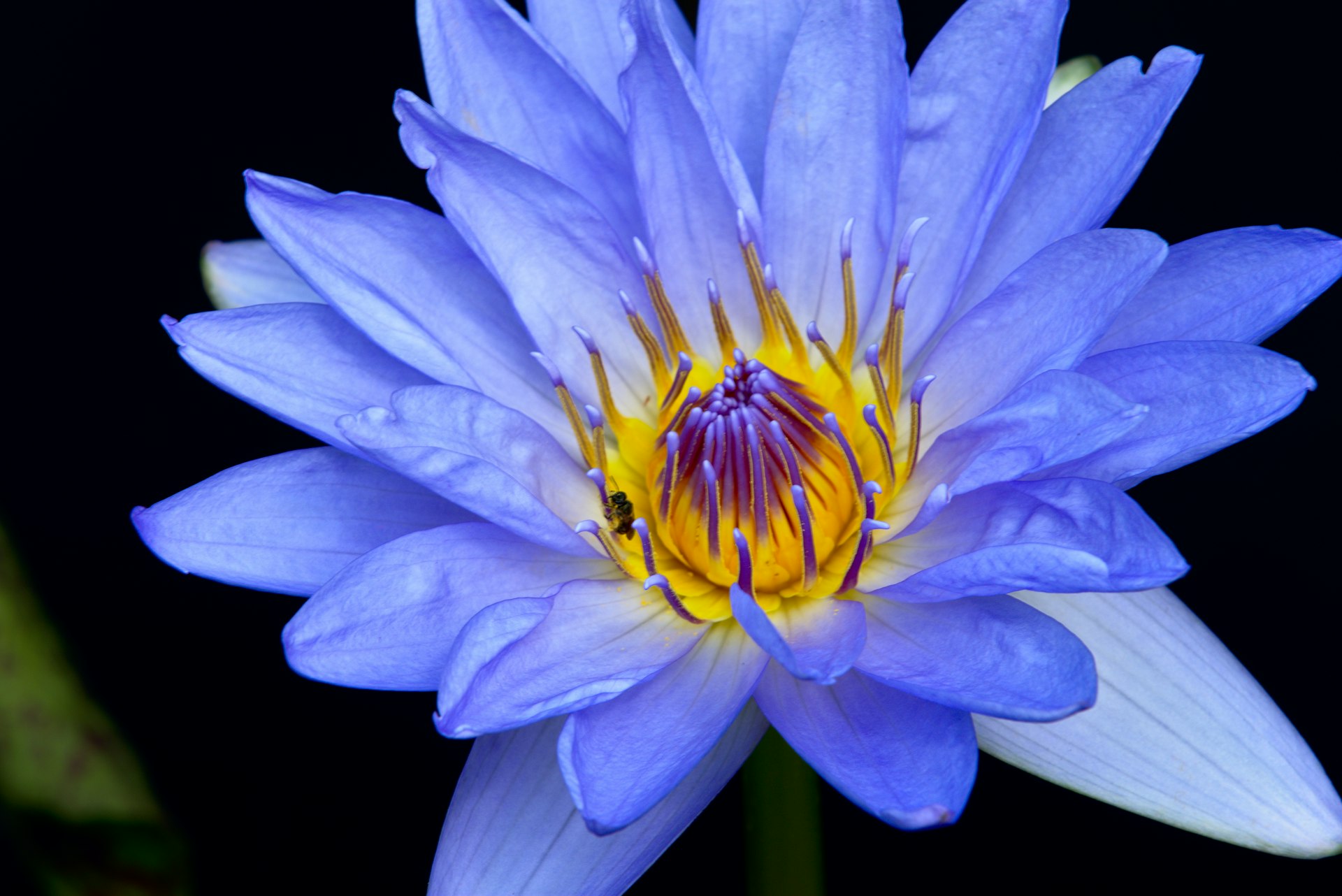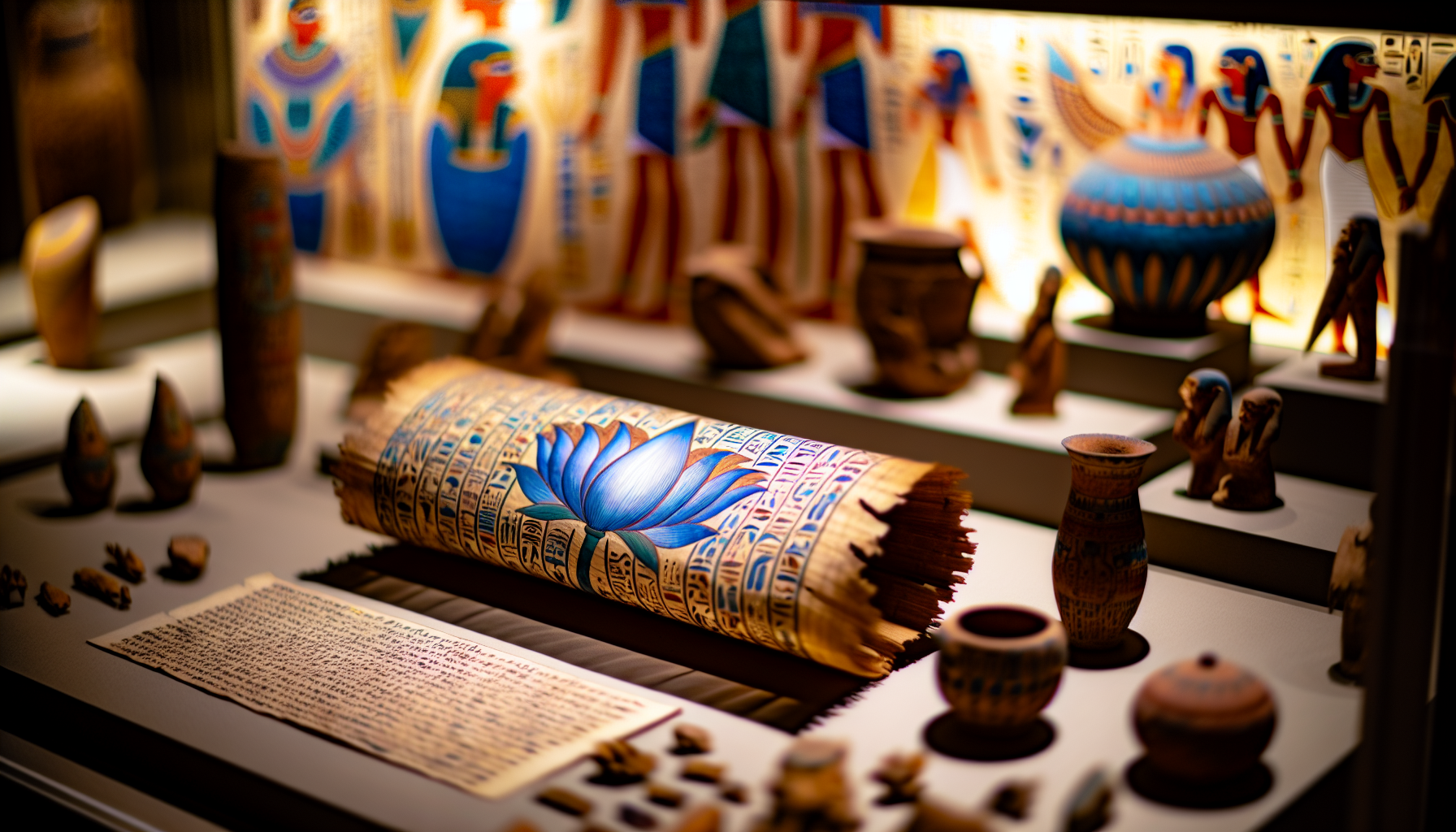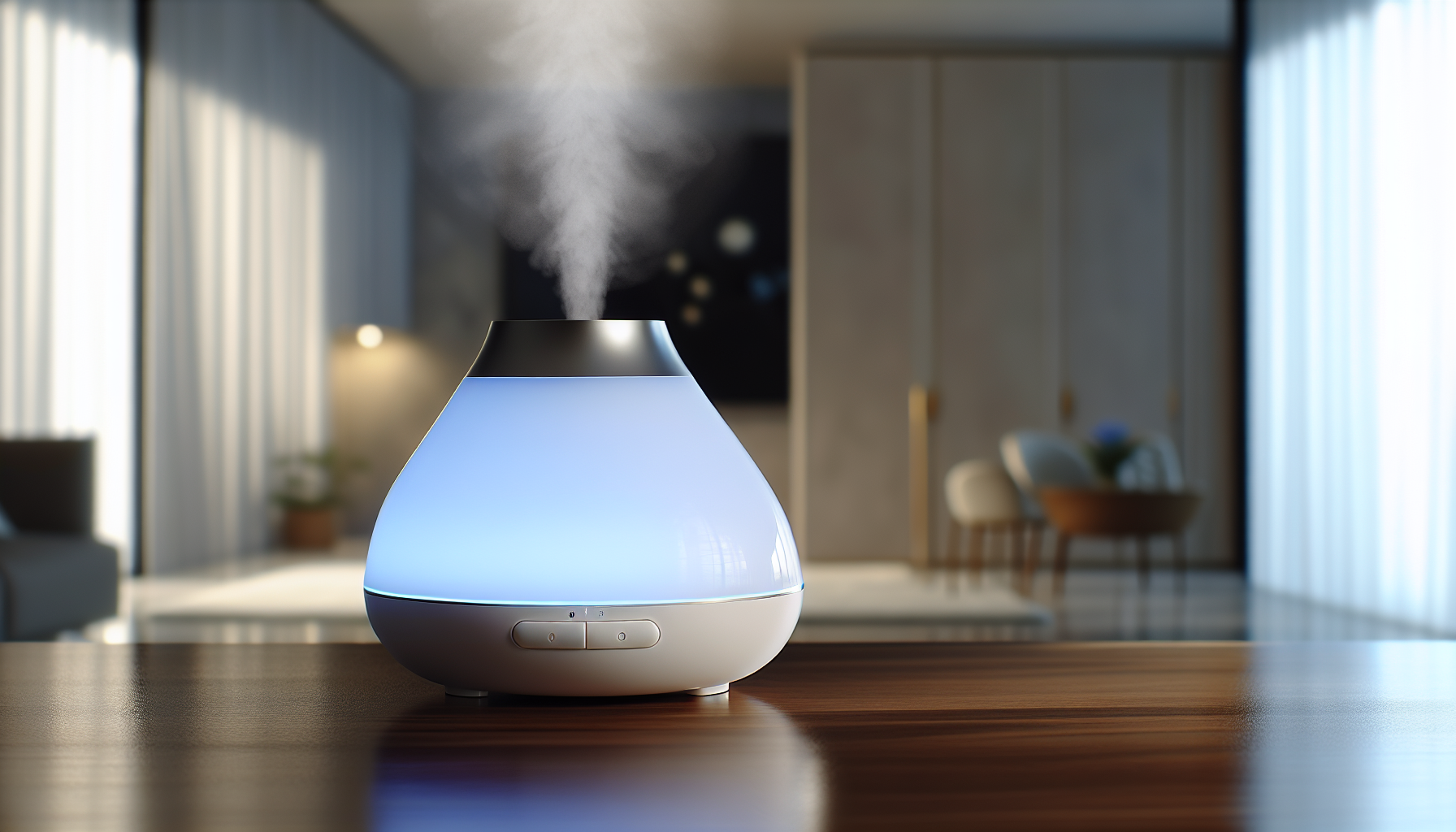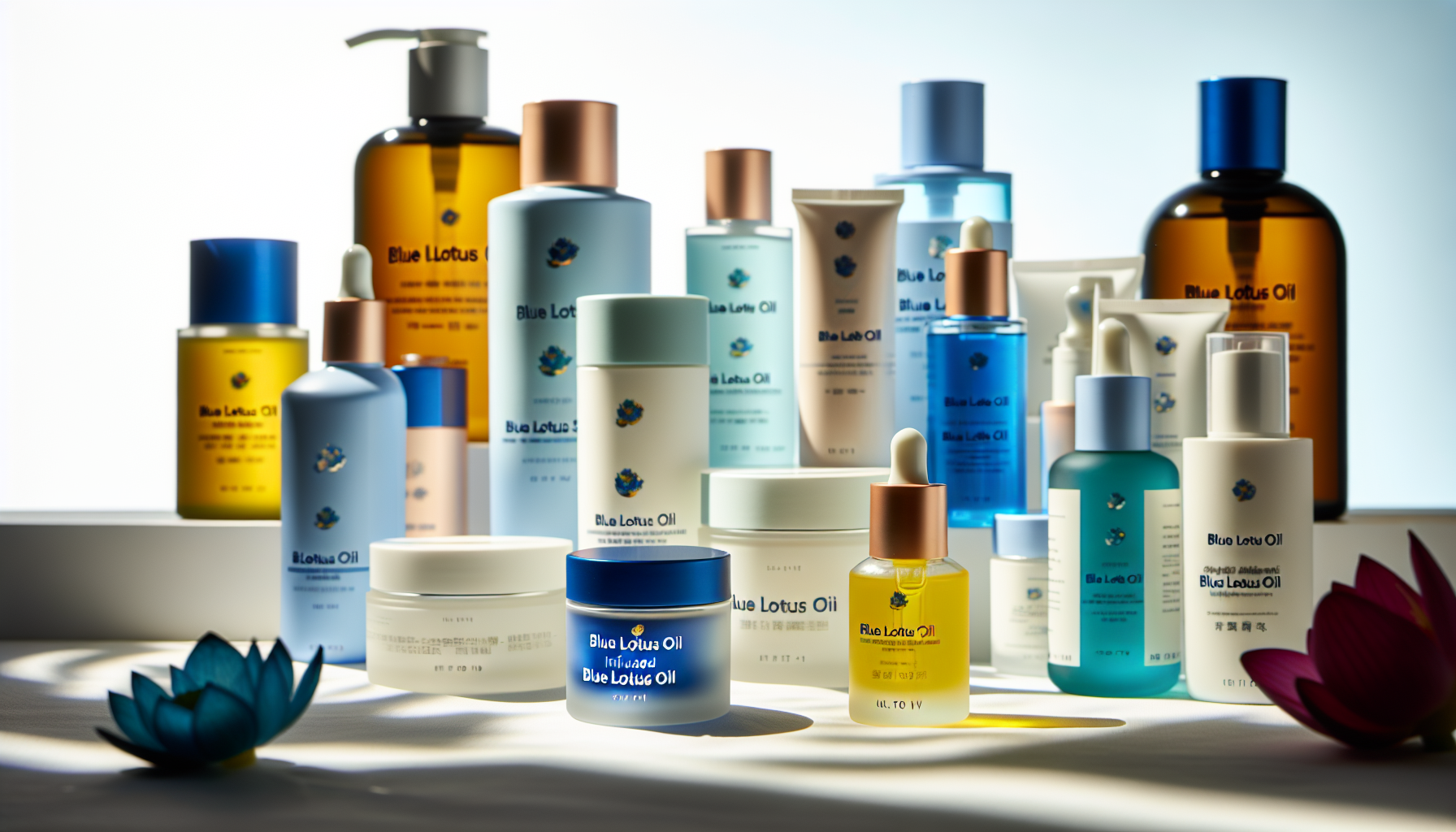What are the benefits of blue lotus oil?
This article explores its multifaceted role in skincare, mental relaxation, and historical significance.
Delve into the practical ways blue lotus oil might enhance your daily well-being, learn about its roots in ancient cultures, and discover how to incorporate it into your personal care practices safely and effectively.
Key Takeaways
- Blue Lotus Oil is steeped in history and revered for its therapeutic and psychoactive properties, once an emblem of life and immortality in ancient Egyptian culture.
- A powerful ally for wellness, Blue Lotus Oil enhances aromatherapy, meditation, and skincare with its calming, moisturizing, and stress-relieving benefits.
- The sacred scent of Blue Lotus Oil not only elevates spiritual and cosmetic practices but also doubles as an aphrodisiac, promising both a sensual and serene experience.
The History and Significance of Blue Lotus

From the fertile banks of the Nile River to the grandeur of royal tombs, the sacred blue lily or blue lotus has been deeply inscribed into the rich tapestry of ancient Egyptian culture. Proudly displayed in temples and depicted in art, the blue lotus, also known as the blue water lily or the lotus flower, was a symbol of life, immortality, and sexuality, revered by both the nobility and the common folk.
Beyond its ornamental appeal, the blue lotus was highly esteemed for its medicinal and mind-altering properties.
Its use in ceremonies related to death and rebirth, usually restricted to higher castes such as priests and royals, resonated with its symbolism of the sun god Ra and the cycle of life. Historical documents like the Ebers Papyrus offer glimpses into the ancient Egyptians’ profound knowledge of the blue lotus’s therapeutic potential, ranging from mood enhancement to pain relief.
However, the allure of the blue lotus comes with a cautionary note.
The blue lotus absolute oil, although a potent tool for wellness and beauty, possesses psychoactive effects that should not be taken lightly.
As always, consultation with healthcare providers is advised before incorporating this mystical essence into your wellness regime.
Blue Lotus in ancient Egyptian rituals

Exploring further, we find that the blue lotus held a revered role in ancient Egyptian rituals. The ancient Egyptians believed that the blue lotus was not just a symbol of life and immortality, but it was also believed to provide a spiritual connection to the divine and the afterlife.
Imagine a flower so potent that it could alter perception and cognition, allowing ancient Egyptians to connect with higher divinity, akin to how cultures today use substances like ayahuasca.
The blue lotus’s features and uses include:
- Ability to flourish in nutrient-deficient mud
- Intoxicating scent and inebriating effects
- Fundamental element in Egyptian rituals, particularly those associated with death and rebirth
- Blue Lotus Oil is reputed to possess therapeutic properties, potentially aiding in mood regulation and providing relief from discomfort.
- Depiction in tomb paintings, underscoring its cultural importance and ritualistic use among ancient Egyptians.
Not just limited to the realm of the divine, the blue lotus also found its place in the earthly pleasures of ancient Egypt.
The Turin Papyrus alludes to secret temple gatherings of elite society, where sacred wines imbued with the Blue Lotus extract were shared, reflecting its use among higher castes and suggestive of its aphrodisiac qualities.
The blue lotus’s portrayal in erotic art and its presence in temple drawings used by priests and royalty suggest that it was not commonly accessible to the general populace, reinforcing its prestige and exclusivity.
Sourcing and Authenticity
While uncovering the mysteries of the blue lotus, the importance of sourcing authentic blue lotus oil becomes evident.
This is no easy task, given the endangered status of the blue lotus and the high cost associated with its production.
To produce a small amount of this precious oil, a large quantity of flowers is required, making the blue lotus oil both rare and costly.
Purchasing from reputable suppliers guarantees not only the authenticity of the oil but also supports local communities.
The cultivation and production of blue lotus oil can generate job opportunities and teach new skills to these communities, providing them with a source of income and a better quality of life.
Moreover, the income stability offered to farmers through the sale of blue lotus flowers for oil extraction prevents the need for them to migrate for work, enabling them to sustain their families within their communities.
The process of sourcing blue lotus oil involves several steps, including:
- Farmers working in waist-high water to care for and harvest the plants
- Establishing Co-Impact Sourcing partnerships to ensure traceable, sustainable, and transparent supply chains
- Guaranteeing the quality of the product
- Ensuring the ethical treatment of the laborers involved
These steps are crucial in maintaining the integrity of the blue lotus oil industry.
Aromatherapy and Relaxation: The Power of Blue Lotus Scent

What makes the blue lotus so captivating is its scent.
The blue lotus essential oil, with its calming properties, has been traditionally valued for aiding in sleep, relieving anxiety, and even inducing a natural ‘high’ to alleviate stress.
Imagine coming home after a long day to the pleasing and exhilarating aroma of blue lotus absolute oil.
Its scent enhances relaxation and ambiance, making it suitable for use in scented products such as scented candles and diffusers.
So, whether you’re winding down for the day or embarking on a meditative journey, the scent of blue lotus can uplift your mood, dispel negative emotions and thoughts, and contribute to stress relief.
Blue Lotus as meditative aid

I love to use blue lotus oil for my meditations. Did you know that the blue lotus can significantly enhance your meditation experiences?
Traditionally, blue lotus (Nymphaea caerulea) has been used to relax the mind and body while opening up consciousness and sensory capacity.
The psychoactive properties of blue lotus, due to the alkaloids Nuciferine and Aporphine, create a relaxed, yet focused and euphoric state, which may deepen your meditative experiences.
Moreover, blue lotus is thought to induce theta brain waves, associated with deep relaxation and meditation.
This makes it a useful tool for emotional reprogramming and moving stagnant emotional energies during meditation.
You can incorporate blue lotus into your meditation routine in various ways.
Drinking blue lotus tea or elixir before meditation can relax your mind and body, while immersing your senses in the herb’s calming fragrance.
Disclaimer: Consumption of blue lotus tea or elixir before meditation may result in a relaxing experience for some individuals, potentially enhancing the sense of calm and immersion in the herb's aroma. However, individual reactions may vary, and it is advisable to exercise caution and consult with a healthcare professional before incorporating new substances into your wellness routine, especially if you have any pre-existing medical conditions or are taking medications.
Alternatively, blue lotus flower can be smoked ceremonially or burned as incense to encourage lucid dreaming and muscle relaxation, potentially aiding you in achieving a meditative state.
Skincare and Beauty Applications

Transitioning from the spiritual to the physical, let’s investigate the beauty benefits offered by blue lotus oil.
Known for delivering deep moisturization to dry skin, blue lotus oil contains antioxidants that help prevent free radical damage. Its soothing properties calm irritated skin, while its anti-inflammatory effects promote a smoother skin texture.
Moreover, blue lotus oil regulates oil production, contributing to acne prevention and maintaining healthy skin.
Its adaptability makes it a versatile addition to your skincare routine, suitable for integration into serums, moisturizers, and facial oils, offering enhanced skin radiance suitable for all skin types.
Carrier Oils and Blending
For maximizing the skin benefits of blue lotus oil, blending it with carrier oils is recommended.
High in squalane content, blue lotus oil makes an effective moisturizer when combined with carrier oils. It blends well with jojoba, argan, or coconut oil, making it suitable for skin applications.
Before full application, it’s recommended to perform a patch test with blue lotus absolute oil when diluted with a carrier oil to ensure no adverse reaction on the skin.
Always remember to avoid using blue lotus absolute oil undiluted on the skin to prevent potential irritation or sensitization.
Incorporating Blue Lotus Oil into Cosmetic Products
In addition to skincare, blue lotus oil can enhance cosmetic products by providing moisturizing benefits, promoting skin elasticity, and offering a unique fragrance.
To ensure efficacy without irritation, blue lotus oil should generally be diluted to a concentration of 1-2% in cosmetic formulations.
Blue lotus oil can be mixed into the oil phase during the production of emulsified products like creams and lotions.
For products like face oils or serums, blue lotus oil can be blended with other carrier oils or actives to boost moisturizing and anti-aging properties.
The rare and distinctive scent of blue lotus oil makes it highly valued in luxury cosmetic products for its aromatherapeutic qualities.
Harnessing the Aphrodisiac Properties of Blue Lotus Oil
The allure of the blue lotus doesn’t end with skincare. It is also considered a natural aphrodisiac, traditionally used to enhance sexual desire and boost libido.
The Turin Papyrus alludes to the existence of sexually themed cults in ancient Egypt, where elite society shared sacred wines imbued with blue lotus extract, highlighting its aphrodisiac qualities.
In aromatherapy, blue lotus oil can:
- Transform negative emotions and thoughts into feelings of delight, excitement, and happiness.
- Act as a natural aphrodisiac
- Act as a sensory stimulant when incorporated into couples’ massage
- Possibly foster deeper emotional connections and intimacy between partners.
So, why not add some blue lotus oil, a wonderful oil, to your next massage session and enjoy its relaxing benefits, skin-softening effects on damp skin, and achieve that healthy glow?
Precautions and Safe Usage of Blue Lotus Oil
While the benefits of blue lotus oil are vast, it’s also crucial to understand its potential effects for safe use.
Blue lotus oil contains compounds such as Aporphine and Nuciferine, which may produce feelings of happiness, euphoria, and calmness.
Aporphine is a compound found in the Blue Lotus flower, scientifically known as Nymphaea Caerulea. This compound is part of a group of alkaloids that play a significant role in the psychoactive properties of the flower. Aporphine is believed to act as a dopamine agonist, stimulating dopamine receptors and inducing feelings of happiness, euphoria, and uplifted mood [1]
When ingested, aporphine is metabolized into apomorphine, which further enhances these positive feelings [2].
The effects of Blue Lotus, containing aporphine and nuciferine alkaloids, are described as dreamlike, euphoric, and relaxing without causing fogginess or drowsiness. Users report experiencing empathy, improved social interactions, increased sexual stamina, and pleasure. Unlike typical psychedelics, Blue Lotus acts as a relaxant rather than a stimulant
However, due to the absence of universally accepted dosage recommendations and a lack of extensive safety data, caution is advised when determining the appropriate amount of Blue Lotus oil to use.
Certain groups are advised to avoid using Blue Lotus oil, including pregnant women, breastfeeding mothers, and children, reflecting the precautionary principle given the current lack of research on its safety for these groups.
When applying blue lotus oil, add a few drops to ensure proper dilution with a carrier oil, avoid internal use, and keep it out of reach of children for a safe and beneficial experience.
Disclaimer:
The information provided here is for general informational purposes only and is not intended to be medical advice. The content is not designed to replace or serve as a substitute for professional medical advice, diagnosis, or treatment. We strongly encourage you to always seek the advice of your physician or another qualified health provider with any questions you may have regarding a medical condition, treatment, or health concerns.
Never disregard professional medical advice or delay in seeking it because of something you have read on this platform. The use of any information provided on this site is solely at your own risk. We do not recommend or endorse any specific tests, physicians, procedures, opinions, or other information that may be mentioned on this platform.
Consultation with a healthcare professional is crucial and irreplaceable for your health and well-being. By using this site, you acknowledge and agree that you understand this disclaimer and that this site does not provide medical advice directly or indirectly.
DIY Blue Lotus Oil Recipes
Eager to apply your newfound knowledge? Let’s explore some DIY blue lotus oil recipes.
To create a DIY beauty serum, infuse blue lotus flowers with a carrier oil like avocado, olive, or jojoba oil, which can soothe and nourish the face and body.
For added calmness and hydration, mix 180ml of carrier oil with 10g of dried blue lotus flowers and 5g of dried calendula flowers, then apply to targeted areas with a dropper.
For a luxurious massage oil, you can:
- Infuse blue lotus flowers in a carrier oil such as sweet almond or apricot kernel oil, which absorb well and leave no residue.
- If you prefer immediate use, warm the carrier oil and blue lotus petals in a slow cooker on low heat for 2-3 hours, with the recommended dilution for massage being 0.5-2%.
- Blue lotus oil also blends harmoniously with other essential oils such as neroli, rose, and ylang ylang, offering a customizable aromatherapy experience.
Summary
To conclude, the blue lotus, an emblem of the ancient Egyptian civilization, emerges as a potent tool for wellness, beauty and meditation in the modern world.
From its use in aromatherapy and meditation to its applications in skincare and cosmetics, the blue lotus oil offers a myriad of benefits.
As we navigate the journey of wellness, it’s essential to remember the need for responsible and safe usage of such potent and sacred essences.
So, as you embark on your journey with the mystical blue lotus, do so with knowledge, respect, and a deep appreciation for this ancient gift of nature.
Frequently Asked Questions
What is blue lotus oil good for?
Blue lotus oil is great for enhancing wisdom and insight, deepening your spiritual connection, and potentially improving your Reiki spiritual experience. Try it out for a heightened spiritual journey!
Why is blue lotus oil so expensive?
Blue lotus oil is so expensive because it takes a large amount of flowers to distill a small quantity of oil, and the rarity of the plant makes the distillation process even more costly. The world of perfumery has to compete for the best harvests, driving up the price even further!
What is the benefit of lotus oil?
Lotus oil provides amazing benefits for the skin by reducing redness and swelling, thanks to its high omega-3 fatty acids and anti-inflammatory properties! Treat your skin to some lotus oil for a natural and soothing solution.
What was the significance of blue lotus in ancient Egypt?
The blue lotus was incredibly significant in ancient Egypt, symbolizing life, immortality, and sexuality, and playing a role in death and rebirth ceremonies. It was also prized for its medicinal and mind-altering properties.
How is blue lotus oil used in aromatherapy and relaxation?
Blue lotus oil is said to be perfect for promoting relaxation and reducing anxiety in aromatherapy. Its delightful scent can be used in candles and diffusers to create a calming atmosphere. So, it's ideal for enhancing relaxation and ambiance.